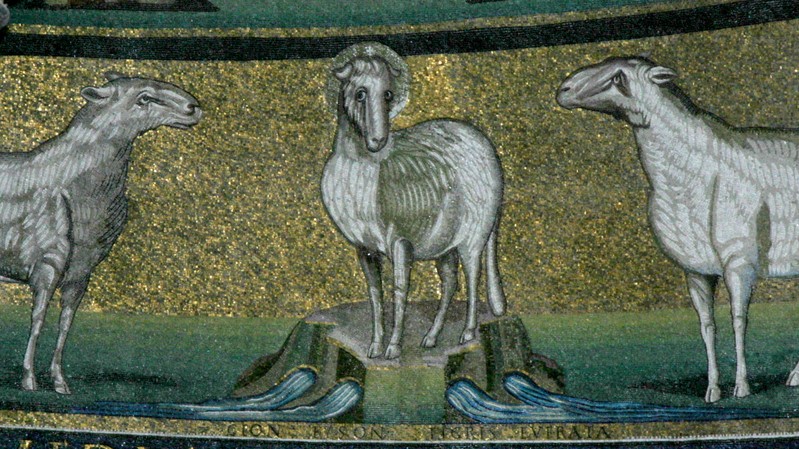
John 1:29
Narrative Lectionary
29 The next dayA he sawB JesusC coming toward him and declared, “HereD is the LambE of GodF who takes awayG the sinH of the world!I
A “next day” = epaurion. 17x in NT. From epi (on, upon, at, what is fitting) + aurion (tomorrow, next day; properly fresh, which implies morning air) [from the same as aer (the air that we breathe, breathing, blowing); from aemi (to breathe, blow)]. This is tomorrow, the next day.
B “saw” = blepo. To look at, see, perceive, be observant. This is usually seeing in a strictly physical sense. It can also mean behold or beware.
C “Jesus” = iesous. From Hebrew Yehoshua (Joshua, the Lord is salvation); from YHVH (proper name of the God of Israel; the self-existent and eternal one); from havah (to become) or from hayah (to come to pass, become, be) + yasha (to deliver, defend, help, preserve, rescue; properly, to be open, wide or free, which implies being safe. So, in a causative sense, this is to free someone. This is Jesus or Joshua in Greek – the Lord saves or the Lord is salvation.
D “here” = idou. From eido (to be aware, see, know, remember, appreciate). This is see! Lo! Behold! Look! Used to express surprise and or draw attention to the statement.
E “Lamb” = amnos. 4x in NT. This is lamb, particularly used to reference a one-year old lamb without defect. It implies innocence and sacrifice. This may be related to the English word “amniotic.”
F “God” = theos. From Proto-Indo-European origins, meaning do, put, place. This is God or a god in general.
G “takes away” = airo. This is to raise, lift, carry, or take away. Can be used to mean raise your voice, keep in suspense, sail away. It can also mean to forgive sin by use of a Hebrew turn of phrase.
H “sin” = hamartia. From hamartano (to miss the mark, do wrong, make a mistake, sin). Hamartano is from a (not) + meros (a part or share). Literally, this means not having one’s share or portion – like not receiving inheritance or what was allotted to you. This word means missing the mark so it is used for guilt, fault, and acts of sin.
I “world” = kosmos. This is the world or the inhabitants of the world, worldly affairs, the universe. Literally, it is something that is ordered. Hence, a system that is ordered like the universe. It can also refer to adornment as that which beautifies and, therefore, brings into order. This is where “cosmos” and “cosmetics” come from.
Image Credit: “Lamb of God” from the Basilica of Cosmas and Damien, 527.
